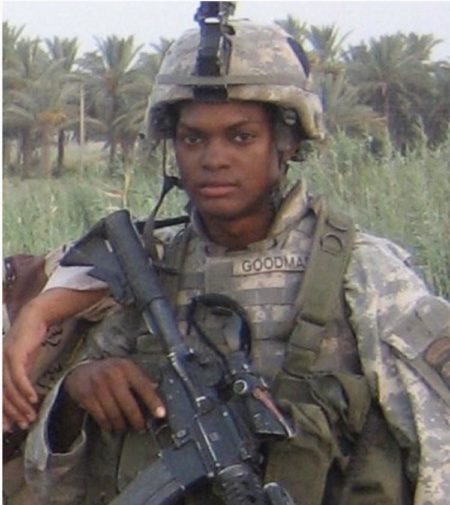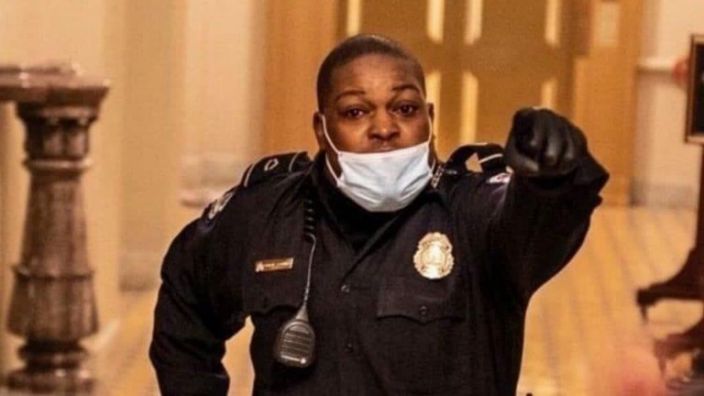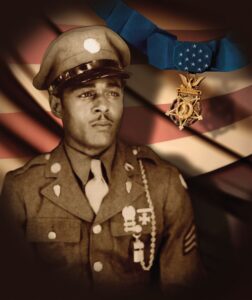Guardians of Democracy
The Purple Heart Foundation prides itself in recognizing military service members throughout the years. The United States military, law enforcement and first responders are an essential part of this country as they give their lives for our freedom and our safety. This past year has been very tough for everyone due to COVID-19, but it has been especially hard on our essential workers. The Purple Heart Foundation would like to extend a heart-warming thank you to these guardians for protecting our freedom and ensuring our safety. During this Black History Month, we recognize Eugene Goodman for his heroic efforts on Jan 6, 2020 during the attack on the capital building.
Eugene Goodman was born and raised in the Southside of Washington D.C. in the 1980’s. Goodman had humble upbringings and graduated from Central High School in Capitol Heights in 1999. Many of his teachers have come out expressing how truly proud they are of him. They described him as a quiet, helpful, and well-mannered student. It is said that, without even knowing it, he took on the role of peacekeeper at a young age by breaking up fights in the lunchroom on occasion. “To save this country, I mean for this person to save this country, I just feel so connected,” one of his teachers, Mr. Banks, expressed through tears.

Not long after, Goodman joined the United States Army, serving from 2002 to 2006. During his time in service, he was part of the 101 st Airborne Division, serving in the Iraq War. He left the military as a Sergeant to later join US Capitol Police in 2008. His former unit XVII Airborne Corps said he was a hero long before the incident on Jan 6. He is truly a guardian of his city, from a very young age.
On Jan 6 th , 2021, our Democracy was attacked by rioters. Shock and disbelief are among some of the reactions that most people had, as everyone watched live on national television as the United States Capitol building was being breached. At the time, both the House and Senate Chambers we’re in the middle of certifying the official win of President elect Joe Biden and Vice President elect Kamala Harris.
The world watched in shock and prayed for the safety of everyone inside as the unimaginable happened at the Capitol that day. It seemed like a movie that went on for hours. All those defending our democracy that day are heroes, but after getting a closer look at personal videos, security footage and more, one hero stood out, and his name was Eugene Goodman.
As Goodman saw the rioter’s approach his location, without a doubt, he took matters into his own hands and tried to diverge the crowd in front of him away from the Senate Chamber while calling for back up in another part of the Capitol. Eugene used himself as bate, knowing that they were only feet away from the Senate Chambers where Vice President Mike Pence and over 100 other officials prepared for the worst. Eugene Goodman’s actions that day may have save their lives, and for that he was recognized worldwide, and awarded the Army’s Distinguished Public Service Award. Both Republican and Democratic politicians, have commended Goodman for single-handedly taking action and preventing a bigger tragedy than what they had already been living.

Following the incident on Jan 6 th , 2021, Eugene Goodman’s actions that day have been highly recognized worldwide, and for those actions was awarded the Army’s Distinguished Public Service Award. Lawmakers have also proposed a bill to award Capital Police Officer Eugene Goodman with the Congressional Gold Medal; one of the highest awards a civilian can receive. As grateful as he is, it is reported that he is also afraid he might be targeted by extremists and said he would do the exact same thing again. During the Presidential Inauguration, Goodman got to escort Vice President-elect Kamala Harris to the stage. He was promoted to Sergeant at Arms of the United States Senate and was announced as such during the Inauguration where he received a standing ovation.
Eugene Goodman has become a household name since that very day. His courageous actions protected not only the people inside the U.S. Capital building, but also everything it stands for, as a symbol of democracy which is the very base of our country. Eugene Goodman goes down in history not only as a great human being but as a guardian of the city of Washington D.C. The Purple Heart Foundation is proud to recognize him as an outstanding member of society for his selfless acts, not only on Jan 6th but throughout his career. Men and women like Eugene, are the ones that keep our country safe and give us the freedom we take for granted every day. So, we thank you, Eugene Goodman, for your bravery, valor, and lifetime of service to this great nation.

SOURCES:
https://en.wikipedia.org/wiki/Eugene_Goodman_(police_officer)
The Honor of a Warrior – Staff Sgt. Edward Allen Carter, Jr.
Edward Allen Carter, Jr.
1916 – 1963
As Black History Month comes to an end, the Purple Heart Foundation honors the exemplary heroism, unmatched determination and commendable bravery of a young African American soldier. His actions were profound for a soldier of any race, religion, gender or creed but to happen during a time of segregation and discrimination, they are especially praiseworthy.
Lets begin at the beginning….Edward Allen Carter, Jr. was born on May 26, 1916, in Los Angeles California, but was raised in Shanghai, China. Carter knew he was destined to join the military from a young age. He attended military grade-school in Shanghai and studied languages until he became fluent in Hindi (his mother’s native tongue), Mandarin (the language of Shanghai), as well as English and German which he would later use in his military career. He began that career at the young age of 15, enlisting in the Chinese Nationalist Army. He rose to the rank of lieutenant before it was uncovered that he was underage and was discharged.
Once he turned 18, Carter attempted to join the U.S. Army but was not accepted due to discrimination. So Carter remained in Europe in the late 1930s, fighting for the Loyalists in the Spanish Civil War. He fought as a Corporal in the Lincoln Brigade until they were forced to flee to Paris in 1938. Upon his return to the United States in 1941, Carter once again attempted to join the U.S. Army and was finally accepted. He was quickly promoted to staff sergeant because of his extensive military experience.
During training in the segregated state of Georgia, Carter witnessed violence and discrimination upon African American soldiers. Many of whom were dishonorably discharged when they fought back. In order to remain in the military, Carter accepted multiple demotions in an era when African Americans were rarely allowed to be officers or even participate in combat. Racism proved to be a hindrance in Carter’s journey to follow his destiny. He volunteered to go into combat but was denied because at the time, African Americans were considered unsuitable for battle.
In 1945 however, replacements were desperately needed, so Carter once again gave up his staff sergeant stripes to volunteer as a Private and was assigned to the 56th Armored Infantry Battalion of the 12th Armored Division. Company commander, Captain Floyd Vanderhoff, recognized Carter for his experience and leadership by restoring his staff sergeant stripes and making him an infantry squad leader.
While fighting with the 12th Armored, Carter became a member of General Patton’s “Mystery Division”. He served as Patton’s personal bodyguard in the push into Germany where his actions in battle earned him a recommendation for the Medal of Honor, the highest award for valor, on March 23, 1945. Carter received the Combat Action Ribbon, the Purple Heart for the wounds he sustained in action, but due to his race he was awarded the Distinguished Service Cross, the country’s second highest military honor, instead of the Medal of Honor.
After the war, Carter was promoted to sergeant first class, but his enlistment was near expiration. During this time the Red Scare was in full effect, and therefore Carter’s request for re-enlistment had been denied due to fear that he may have communist ties from his exposure in China. He received an honorable discharge in October 1949 and lived out the remainder of his life as a family man until he passed away on January 30, 1963 at the age of 46.
Three decades later, a commission was assigned to identify unrecognized African-American heroes from World War II. Ten men were cited to receive the Medal of Honor. Edward Allen Carter Jr. was identified and recommended for honors for his actions fifty-two years after voluntarily leading a three-man group across an open battlefield. Edward Allen Carter, III received the Medal of Honor on behalf of his grandfather from President Bill Clinton on January 13, 1997. His citation read…
“For extraordinary heroism in action on 23 March 1945, near Speyer, Germany. When the tank on which he was riding received heavy bazooka and small arms fire, Sergeant Carter voluntarily attempted to lead a three-man group across an open field. Within a short time, two of his men were killed and the third seriously wounded. Continuing alone, he was wounded five times and finally forced to take cover. As eight enemy riflemen attempted to capture him, Sergeant Carter killed six of them and captured the remaining two. He then crossed the field using as a shield his two prisoners from which he obtained valuable information concerning the disposition of enemy troops, in their native tongue. Staff Sergeant Carter’s extraordinary heroism was an inspiration to the officers and men of the Seventh Army Infantry Company Number 1 (Provisional) and exemplify the highest traditions of the Armed Forces.”
Against all odds, Edward Allen Catrer, Jr. fought for what was right and followed his destiny. The Purple Heart Foundation Salutes Staff Sgt. Edward Allen Carter, Jr. for service and sacrifice. This Black History Month join us in honoring all service men and women who bravely follow their destiny in the eyes of discrimination and adversity.



